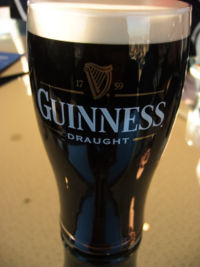Guinness: Difference between revisions
imported>Subpagination Bot m (Add {{subpages}} and remove any categories (details)) |
imported>Ro Thorpe mNo edit summary |
||
| Line 8: | Line 8: | ||
'''Guinness''' is a type of [[stout]], originally brewed in [[Dublin]], [[Ireland (state)|Ireland]]. Guinness has become synonymous with [[Irish]] nationality and sympathies. It is one of Ireland's most famous exports, comparable with Swiss watches or French cheese. | '''Guinness''' is a type of [[stout]], originally brewed in [[Dublin]], [[Ireland (state)|Ireland]]. Guinness has become synonymous with [[Irish]] nationality and sympathies. It is one of Ireland's most famous exports, comparable with Swiss watches or French cheese. | ||
It was founded by Arthur Guinness (b. 1725, County Kildare, d. 1803). In 1752 he inherited £100 from the Archbishop Price. Three years later he setup an brewery in Leixlip, County Kildare. In 1759, he left his brother in charge of the Leixlip brewery and Arthur Acquired a 9000 year lease for an old brewery in Dublin. This lease included water rights, for a rent of £45 per year. In the 1770's London Porter became popular, Arthur started producing this in his own brewery. In 1799 he stopped production of his other traditional ales to concentrate solely on Porter. The London Porter turned into Dublin Stout. | |||
Revision as of 16:29, 28 November 2007
- This article deals with the famous alcoholic beverage. For other uses of the name, including Guinness World Records and Sir Alec Guinness, see Guinness (disambiguation)
Guinness is a type of stout, originally brewed in Dublin, Ireland. Guinness has become synonymous with Irish nationality and sympathies. It is one of Ireland's most famous exports, comparable with Swiss watches or French cheese.
It was founded by Arthur Guinness (b. 1725, County Kildare, d. 1803). In 1752 he inherited £100 from the Archbishop Price. Three years later he setup an brewery in Leixlip, County Kildare. In 1759, he left his brother in charge of the Leixlip brewery and Arthur Acquired a 9000 year lease for an old brewery in Dublin. This lease included water rights, for a rent of £45 per year. In the 1770's London Porter became popular, Arthur started producing this in his own brewery. In 1799 he stopped production of his other traditional ales to concentrate solely on Porter. The London Porter turned into Dublin Stout.
